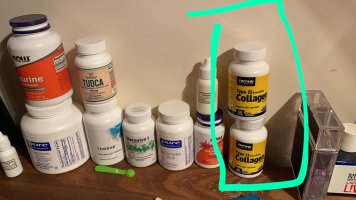FitnessMike
Member
- Joined
- Jan 18, 2020
- Messages
- 1,676
Thanks, so how about if we can rebuild fibrous cartilage with all the supplements, and maintaining these cartilages with continuous supplementation, would that be good enough?All the supplements and methods on this page are for rebuilding fibrous cartilage.
I really hope that loading 60g of gelatine will help with regenerating, on top of this i i got glucosamine sulfate as you recommended, hyaluronic acid, and silica from bamboo.
On top of the above, I do my red light on both knees 20min twice a day.


